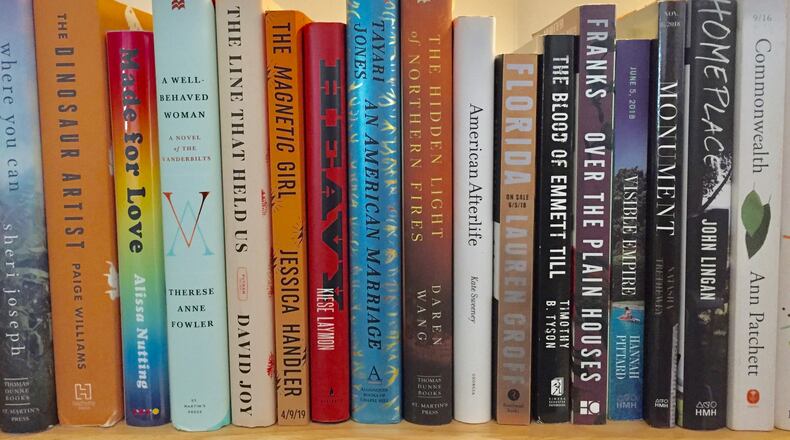Whatever you do, don’t mistake Karen Russell’s new book, “Orange World and Other Stories,” for a bit of lighthearted beach reading. Crafted from the kind of deep-seated anxieties and paranoias that wake us with a jolt at 2 a.m. and leave us staring into the dark trembling with trepidation, these eight short stories command our full attention as they poke at our darkest fears and stir up a foreboding sense of dread.
The author of the critically acclaimed novel "Swamplandia!" and two other short-story collections, Russell won a Guggenheim Fellowship and a MacArthur "Genius Grant" Fellowship and was a finalist for the Pulitzer Prize all before she turned 33. The Miami native is some kind of wunderkind brainiac, and her brilliance blazes across the pages of these inventive stories that challenge the reader with their dizzying leaps in time, place, logic and reality.
Set in wildly divergent environs — from 17th-century Croatia, to Depression-era Oregon, to present-day Mojave Desert, to futuristic “New Florida” — the stories revolve around external objects of fear, ranging from ghosts and zombies to tornadoes and climate change. But festering beneath the surfaces of these stories are the corrosive, internal boogeymen that haunt our lives: fear of failure, commitment, loneliness, death.
In “The Bad Graft,” a pair of young drifters in love, or at least lust, go hiking in Joshua Tree National Park. “The boy, Andy, was a reader; he said that they were seafarers, wanderers. ‘Ever unfixed,’ a line from Melville, was scraped in red ink across the veins of his arm. The girl, Angie, was three years sober and still struggling to find her mooring on dry land.”
They arrive at the park during the annual fertility dance that occurs between the Joshua trees’ greenish-white blooms and the hordes of yucca moths they attract and depend upon for pollination. When Angie is pricked by the spine of a Joshua tree, she becomes inhabited by its spirit, which compels her to suddenly put down roots in the desert, to Andy’s consternation. Meditating on the push-pull tension between co-dependence and independence in a relationship, Angie wonders about the moth and the tree, “Can’t the two species untwine, separate their fortunes?”
Love also figures in “Bog Girl: A Romance,” about a Welsh boy harvesting peat for fuel who discovers a girl’s body buried in the bog. He promptly brings her home and falls in love, to his mother’s chagrin. “She doesn’t work, she doesn’t help. All day she lazes around the house,” the mother complains to a confidant. The mother tries everything she can to bust up the two lovebirds, but it takes something wholly unexpected to occur before love’s fickle nature is revealed.
Similar themes are explored in “Madame Bovary’s Greyhound,” about the literary heroine’s relationship with her dog, Djali, a canine empath who adores her beautiful mistress and absorbs all her emotions.
“It was a strange accordion that linked the woman and the dog: Vaporous drafts caused their pink and gray bellies to clutch inward at the same instant. Moods blew from one mind to the other, delight and melancholy. In the blue atmosphere of the bedroom, the two were very nearly (but never quite) one creature.”
Eventually, though, Djali has her fill of Emma Bovary’s bored, privileged misery, and she breaks free. She experiences adventures both thrilling and terrifying before taking up with Hubert, a humble game warden, who names her after himself. One day, Hubert and Hubert encounter Emma, and the greyhound has a difficult decision to make.
By far, the darkest of the lot is “Black Corfu,” set on the Croatian island of Korcula in 1620. Despite his medical skills, the unnamed doctor at the center of this story is relegated, by virtue of his dark skin, to the role of Posthumous Surgeon, whose job it is to cut the hamstrings of the dead so that, should they “be resuscitated by the devil’s breath,” they would be hindered from walking the earth again.
Although he is tormented by his inability to use his skills to heal the sick, the doctor is a proud man who is respected for his years of service to the town and beloved by his wife and children. But his life tragically unravels when he’s enlisted to train a reluctant apprentice who spreads a career-ending lie about the doctor as a way to get out of the assignment. The doctor gets the last laugh, in a sick turn of events, but it’s the specters of racism and Fake News and the irrevocable damage they can do to a community (or nation) that resonate with terror.
The collection ends with the title story, “Orange World,” a chilling tale about a new mother who makes a horrifying deal with the devil to ensure the health and well-being of her child. The story drives a stake into the heart of parents’ greatest fear and gives it a twist by posing the question: How far would you go to ensure your child’s safety? And that’s how Rae, an earnest first-time mother in Portland, Oregon, finds herself in the gutter every night while the devil “lays its triangular head on her collarbone, using its thin-fingered paws to squeeze milk from her left breast into its hairy snout.”
The implication is clear: The things we do out of fear are not pretty.
FICTION
‘Orange World and Other Stories’
by Karen Russell
Alfred A. Knopf
288 pages, $26.95
About the Author
Keep Reading
The Latest
Featured





